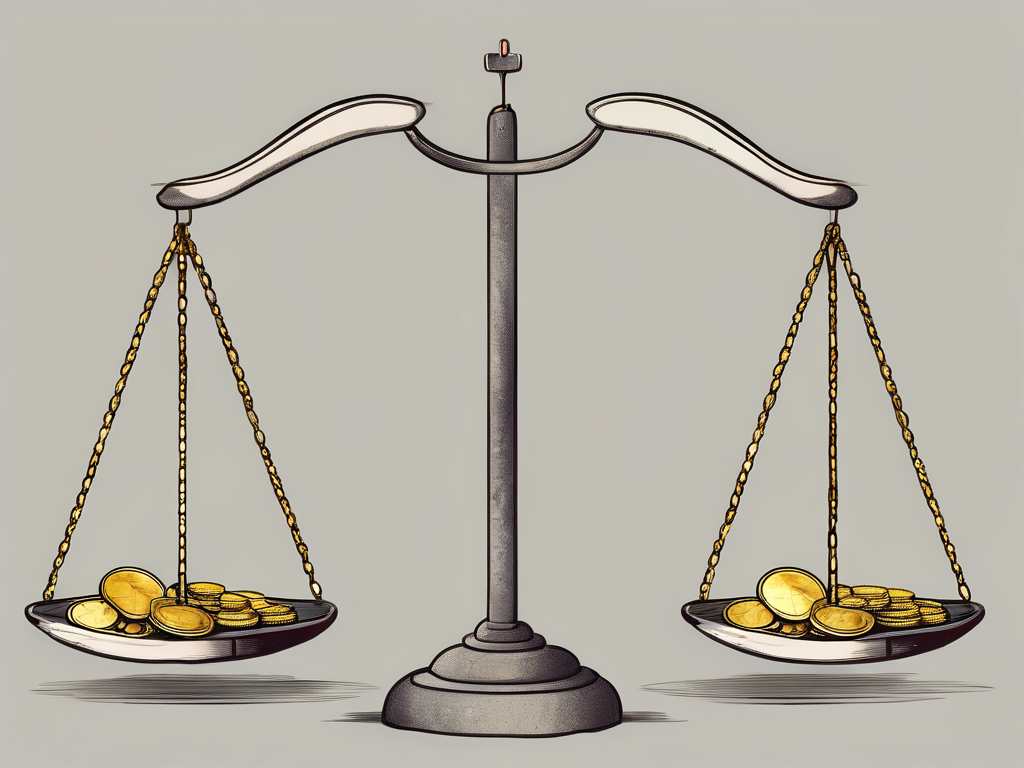Self care has become a buzzword in recent years, with people emphasizing the importance of taking care of oneself physically, mentally, and emotionally. But what does the Bible have to say about this concept? Is self care in line with biblical teachings? In this article, we will explore the biblical perspective on self care, the balance between self care and selflessness, and practical self care practices inspired by the Bible.
Understanding the Concept of Self Care in Biblical Context
Before we delve into what the Bible says about self care, it is important to define what self care means from a biblical perspective. In a society that often encourages self-centeredness and selfishness, self care can be misconstrued as self-indulgence. However, this understanding fails to capture the true essence of self care as depicted in the Bible.
Self care, in a biblical context, goes beyond mere pampering or selfish desires. It involves nurturing ourselves physically, mentally, and emotionally in order to better serve God and others. It is about maintaining a healthy and balanced lifestyle that enables us to fulfill our God-given purpose.
When we take care of ourselves, we are acknowledging the fact that our bodies are temples of the Holy Spirit (1 Corinthians 6:19-20). By prioritizing self care, we are honoring God’s creation and showing gratitude for the gift of life. It is through self care that we can fully embrace and appreciate the life that God has given us.
Defining Self Care from a Biblical Perspective
Biblical self care encompasses various aspects of our lives. It involves taking care of our physical bodies by engaging in regular exercise, eating nutritious food, and getting enough rest. By doing so, we are ensuring that our bodies are healthy and strong, ready to serve God and others.
Mental and emotional self care is equally important in a biblical context. This includes engaging in activities that promote mental well-being, such as reading uplifting literature, meditating on God’s Word, and seeking wise counsel when needed. It also involves managing stress and practicing forgiveness, both towards ourselves and others.
Furthermore, biblical self care emphasizes the importance of nurturing our spiritual well-being. This involves spending time in prayer and meditation, seeking a deeper relationship with God, and participating in acts of worship and service. By prioritizing our spiritual growth, we are aligning ourselves with God’s will and allowing Him to work in and through us.
The Importance of Self Care in Christianity
Self care is not only important for our own well-being but also for our ability to serve others. As Christians, we are called to love our neighbors as ourselves (Mark 12:31). This requires us to love and care for ourselves first, so that we have the strength and capacity to love and care for others.
When we neglect our own self care, we risk becoming burnt out, physically and emotionally drained, and unable to effectively fulfill our responsibilities and serve others. By prioritizing self care, we are equipping ourselves to be better disciples of Christ, ready to spread His love and compassion to those around us.
Additionally, self care allows us to set healthy boundaries in our relationships and commitments. It helps us recognize our limitations and prioritize our time and energy in a way that honors God and aligns with His purposes for our lives. Through self care, we are able to discern what truly matters and make intentional choices that reflect our values and priorities.
In conclusion, self care in a biblical context is not about self-indulgence or selfishness. It is about nurturing ourselves physically, mentally, and spiritually, so that we can better serve God and others. By prioritizing self care, we honor God’s creation, acknowledge the importance of our own well-being, and equip ourselves to fulfill our God-given purpose in this world.
Biblical Verses Related to Self Care
The Bible contains numerous verses that highlight the importance of self care. These verses serve as reminders for us to prioritize our well-being in order to effectively carry out our God-given responsibilities.
Self care is a concept that encompasses taking care of our physical, emotional, and spiritual needs. It involves making intentional choices to nurture and maintain our overall well-being. Let’s explore some biblical verses that specifically address physical and emotional self care.
Verses Highlighting Physical Self Care
1 Corinthians 6:19-20 reminds us that our bodies are temples of the Holy Spirit and that we should honor God with our bodies. This encourages us to take care of ourselves physically by practicing good nutrition, regular exercise, and getting enough rest.
Our bodies are a gift from God, and it is our responsibility to steward them well. Just as we would take care of a precious gift, we should also prioritize our physical health. This includes nourishing our bodies with wholesome food, engaging in physical activities that strengthen and energize us, and ensuring we get enough rest to rejuvenate our bodies.
In Psalm 139:14, we are reminded that we are fearfully and wonderfully made by God. This verse reminds us to appreciate and care for our physical bodies, acknowledging that they are gifts from God.
When we recognize the intricate design of our bodies and the incredible way they function, we can develop a deep sense of gratitude. This gratitude can motivate us to take care of our bodies by making healthy choices and treating them with respect.
Verses Emphasizing Emotional Self Care
Proverbs 17:22 tells us that a joyful heart is good medicine, while Proverbs 14:30 reminds us that a tranquil heart brings life to the body. These verses highlight the importance of emotional well-being and encourage us to engage in activities that bring joy and peace to our hearts.
Our emotional well-being is just as important as our physical health. Taking care of our emotions involves finding healthy ways to manage stress, cultivating joy, and seeking peace in our lives. Engaging in activities that bring us happiness, such as spending time with loved ones, pursuing hobbies, or practicing mindfulness, can contribute to our emotional well-being.
Furthermore, in Philippians 4:6-7, we are urged to not be anxious about anything but to present our requests to God with thanksgiving. This reminds us to lean on God in times of emotional distress, seeking His peace and comfort.
When we face emotional challenges, it is essential to turn to God for guidance and support. Through prayer, we can find solace and peace in His presence. Trusting in God’s love and provision can alleviate anxiety and bring a sense of calm to our hearts.
As we reflect on these biblical verses, let us remember the importance of self care in our lives. By prioritizing our physical and emotional well-being, we can better serve God and others, fulfilling our purpose with vitality and joy.
The Balance Between Self Care and Selflessness in the Bible
The Bible emphasizes the importance of selflessness and serving others. However, this does not mean neglecting our own well-being. It is crucial to strike a balance between self care and selflessness in order to live according to biblical principles.
When we think about selflessness in the Bible, we are reminded of the teachings of Jesus. He taught us to love our neighbors as ourselves (Mark 12:31), which implies that we must first have a healthy love for ourselves. This love for ourselves, however, should not be driven by selfish ambitions but by a desire to honor God and serve others.
Striking a balance between self care and selflessness can be challenging, but it is essential for our overall well-being. Self care should be seen as a means to an end, rather than an end in itself. When we take care of ourselves, we are better equipped to serve and love others. It is like the instructions we hear on an airplane – put on your own oxygen mask first before assisting others. Similarly, when we prioritize self care, we ensure that we are in a better position to care for those around us.
Looking at the life of Jesus, we can find examples of this balance. Jesus often withdrew to solitary places to pray and rest, recognizing the importance of taking care of Himself. He understood the need to recharge and rejuvenate. Yet, He also devoted Himself to serving others selflessly. Jesus healed the sick, fed the hungry, and comforted the broken-hearted, showing us that selflessness is a fundamental aspect of living a life of faith.
It is important to note that self care does not mean indulging in selfish desires or neglecting our responsibilities. Rather, it means taking intentional steps to nurture our physical, emotional, and spiritual well-being. This can include activities such as exercising, spending time in nature, practicing mindfulness, seeking support from loved ones, and engaging in activities that bring us joy and fulfillment.
When we find the balance between self care and selflessness, we are able to live out the biblical principles of love, compassion, and service. By taking care of ourselves, we are better equipped to pour into the lives of others, sharing God’s love and grace with those around us.
Self Care Practices Inspired by the Bible
Biblical principles provide us with practical guidance on how to incorporate self care into our daily lives. Here are a few self care practices inspired by the Bible:
Prayer and Meditation as Forms of Self Care
Spending time in prayer and meditation is a powerful way to care for our spiritual and emotional well-being. It allows us to connect with God, seek His guidance, and find peace in His presence. By incorporating regular prayer and meditation into our routines, we can experience spiritual nourishment and inner peace.
When we engage in prayer, we open ourselves up to a deeper relationship with God. We can share our joys, sorrows, and concerns with Him, knowing that He is listening and cares for us. Through prayer, we can find comfort, strength, and hope in the midst of life’s challenges.
Meditation, on the other hand, involves quieting our minds and focusing on God’s Word. It allows us to reflect on His promises, gain wisdom, and find clarity in our thoughts. By meditating on Scripture, we can renew our minds and align our thoughts with God’s truth.
Rest and Sabbath: Biblical Endorsement of Downtime
The Bible teaches the importance of rest and observing a Sabbath day. In Exodus 20:8-10, God commanded the Israelites to rest on the seventh day, as He did after the creation of the world. Observing regular periods of rest and taking a Sabbath day provides us with the opportunity to rejuvenate and recharge physically, mentally, and spiritually.
Resting is not a sign of laziness, but rather a recognition of our human limitations. God designed us to need rest, both for our bodies and our minds. When we prioritize rest, we allow ourselves to recover from the demands of daily life, reduce stress levels, and prevent burnout.
The Sabbath, in particular, is a special day set apart for rest and worship. It is a time to pause from our usual activities and focus on our relationship with God. By observing the Sabbath, we honor God’s commandment and create space in our lives for spiritual reflection and renewal.
During our Sabbath rest, we can engage in activities that bring us joy and refresh our souls. Whether it’s spending time in nature, reading a good book, or enjoying quality time with loved ones, the Sabbath provides us with the opportunity to prioritize self care and reconnect with what truly matters.
Overcoming Guilt Associated with Self Care
Some Christians may experience feelings of guilt or selfishness when prioritizing self care. However, it is important to address these misconceptions and embrace self care as a Christian duty.
Addressing Misconceptions About Self Care in Christianity
Self care is not a selfish act but a responsible and necessary practice that enables us to fulfill our God-given purpose. It equips us to serve others with love and compassion, without experiencing burnout or neglecting our own well-being.
Embracing Self Care as a Christian Duty
By understanding self care in the context of biblical teachings and embracing it as a Christian duty, we can overcome feelings of guilt and fully engage in self care practices that honor God and benefit ourselves and others.
In conclusion, the Bible does speak to the importance of self care. It encourages us to take care of our physical, mental, and emotional well-being as an act of stewardship over our bodies, which are temples of the Holy Spirit. By striking a balance between self care and selflessness, and incorporating biblical principles into our self care practices, we can lead healthier, more fulfilling lives that bring glory to God and bless those around us. So let us embrace the concept of self care and seek to live out biblical self care in our daily lives.












